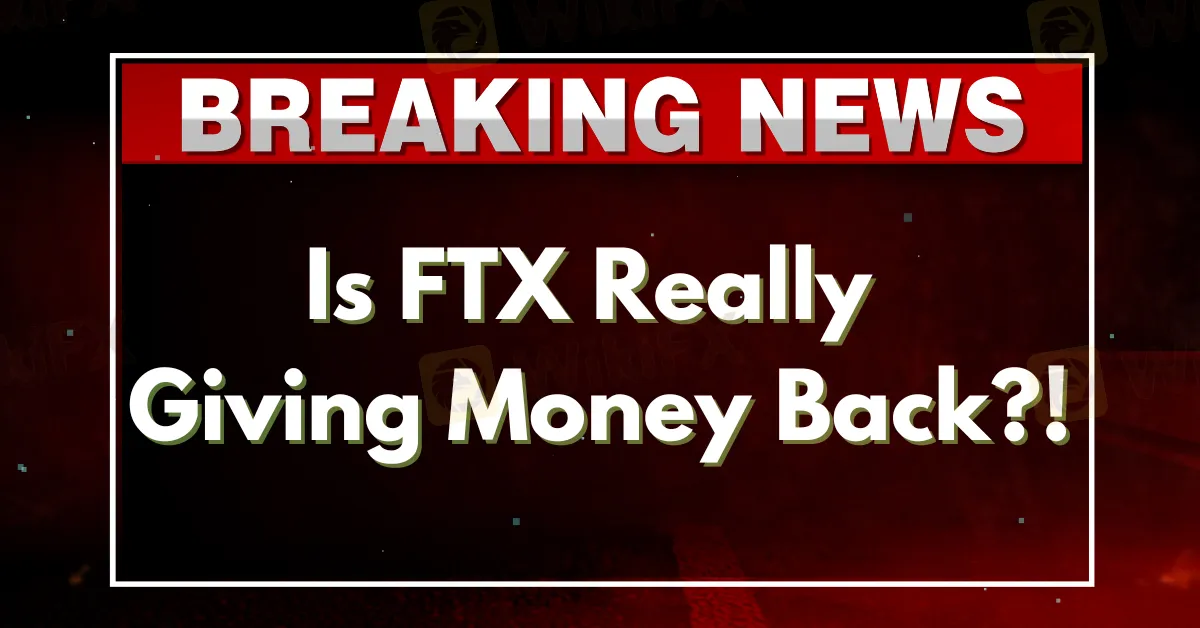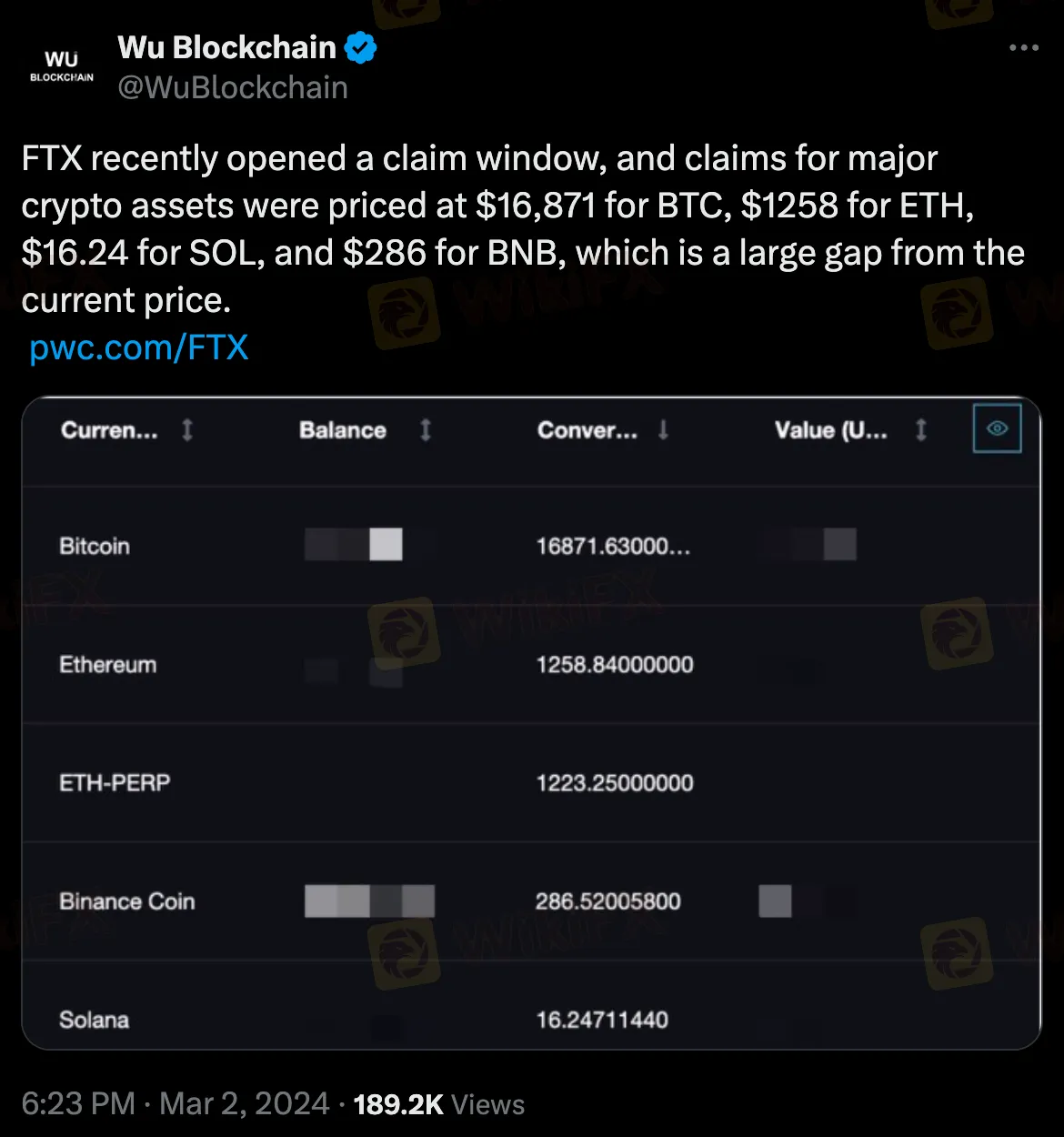简体中文
繁體中文
English
Pусский
日本語
ภาษาไทย
Tiếng Việt
Bahasa Indonesia
Español
हिन्दी
Filippiiniläinen
Français
Deutsch
Português
Türkçe
한국어
العربية
Is FTX Really Giving Money Back?!
Abstract:As FTX, the cryptocurrency exchange, initiates the opening of its claim window amidst insolvency, it finds itself embroiled in controversy, facing user discontent over the alleged undervaluation of major crypto assets and triggering discussions about legal ramifications and financial restitution.

In the latest developments surrounding the once-prominent cryptocurrency exchange FTX, now undergoing insolvency proceedings, the platform has initiated the claims process for creditors seeking to recover their digital assets. However, FTX finds itself under scrutiny on social media, with users expressing discontent over the perceived undervaluation of major crypto assets in comparison to their current market prices.
As reported by crypto journalist Colin Wu on March 2nd, FTX's claim window pricing has been set at $16,871 for BTC, $1,258 for ETH, $16.24 for SOL, and $286 for BNB.

These figures, notably below prevailing market rates, have sparked criticism and concerns among affected users, with accusations of wealth appropriation and calls for legal action against what some perceive as a scam.

FTX's bankruptcy plan is designed to reimburse customers based on crypto prices at the time of the exchange's filing for bankruptcy in November 2022. While FTX contends that U.S. bankruptcy law dictates claims to be valued using the filing date, dissenting voices argue that this approach undervalues cryptocurrencies that have experienced substantial appreciation since the market's low point in 2022.
PwC Partners, the court-appointed liquidators for FTX assets, issued an official statement addressing the situation. FTX Digital Markets is undergoing a Chapter 11 settlement with FTX Trading and related debtors, with the primary objective being the consolidation of assets from the estates of both entities. Creditors have been instructed to submit electronic claims by May 15, with an anticipated initial interim distribution through a claims portal managed by PwC expected in late 2024 or early 2025, with all eligible claims denominated in U.S. dollars. PwC has faced scrutiny from various quarters, with critics contending that the firm emerges as the primary beneficiary amid the prevailing tumult within FTX.
In response to growing concerns, FTX issued a precautionary statement regarding its authorized investment manager, cautioning against unauthorized third parties attempting to bid on behalf of FTX Debtors. The exchange clarified that the sale of Digital Assets, mandated by a bankruptcy court order, falls solely under the jurisdiction of Galaxy Asset Management, the court-appointed investment manager. FTX emphasized that only Galaxy Asset Management holds the authorization to manage selling offers or buying requests.

Disclaimer:
The views in this article only represent the author's personal views, and do not constitute investment advice on this platform. This platform does not guarantee the accuracy, completeness and timeliness of the information in the article, and will not be liable for any loss caused by the use of or reliance on the information in the article.
Read more

Why More People Are Trading Online Today?
Discover why online trading is booming with tech, AI, and a push for financial freedom. From stocks to crypto, it’s a thrilling hustle for all.

SEC Ends Crypto.com Probe, No Action Taken by Regulator
The SEC has closed its investigation into Crypto.com with no action taken. Crypto.com celebrates regulatory clarity and renewed momentum for the crypto industry.

Interactive Brokers Expands Crypto Trading with Solana, XRP, Cardano, and Dogecoin
Interactive Brokers adds Solana, XRP, Cardano, and Dogecoin to its platform, enabling U.S. and U.K. clients to trade crypto 24/7 with low fees.

South Korean Regulator Blocks Access to 17 Unreported Offshore VASP Apps on Google Play
South Korea’s Financial Intelligence Unit (FIU) has blocked access to 17 unreported offshore VASP apps on Google Play to protect domestic users from potential financial risks.
WikiFX Broker
Latest News
Why Are Financial Firms Adopting Stablecoins to Enhance Services and Stability?
Experienced Forex Traders Usually Do This Before Making a Lot of Money
Octa vs XM:Face-Off: A Detailed Comparison
When High Returns Go Wrong: How a Finance Manager Lost RM364,000
Bridging Trust, Exploring Best—WikiEXPO Hong Kong 2025 Wraps Up Spectacularly
Interactive Brokers Expands Crypto Trading with Solana, XRP, Cardano, and Dogecoin
Fidelity Investments Explores Stablecoin Innovation in Digital Assets Sector
Why More People Are Trading Online Today?
SEC Ends Crypto.com Probe, No Action Taken by Regulator
Broker Comparison: FXTM vs XM
Currency Calculator







